Photographs: Jason Reed/Reuters
Richard Fontaine, senior fellow at the Centre for a New American Security and author of the Centre's recent report Natural Allies: A Blueprint for the Future of US-India Relations, believes that United States President Barack Obama's endorsement of India's candidacy for a permanent seat in the United Nations Security Council was 'a bold move'.
"By publicly supporting India's membership, President Obama made the most dramatic gesture possible toward an American embrace of India," he told rediff.com, and added, "It's an important step that holds the potential to rejuvenate what has become something of a stalled relationship."
Fontaine, in an interview with rediff.com, acknowledged, "Of course, now some of the difficulties will begin. Pakistan has already reacted negatively to the announcement; Brazil and others are likely to ask where the support for their Security Council membership is."
"And Indians may well inquire about what concrete steps the United States is going to take to achieve the membership that the President publicly supported," he added.
Text: Aziz Haniffa in Washington, DC
'Inclusion of Myanmar in speech was welcome'
Image: Voters wait to cast their ballots at a polling station in Sittwe, Rakhine state in MyanmarPhotographs: Soe Zeya Tun/Reuters
Fontaine noted, "No expansion is on the table now and probably will not be at any point in the near future.
Obama had said that 'in the years ahead' he looks forward to India securing permanent membership in the UNSC.
But Fontaine reiterated, "Nevertheless, this step was more about US-India relations than about the UN Security Council. It's a recognition of India's emergence to global power status and an expression of US support for that emergence."
Fontaine also believes that Obama's "inclusion of Myanmar in his Parliament speech was surprising but very welcome."
He said, "The Indian government has pursued a policy of growing closer to the Junta in Myanmar and explains that policy in geopolitical terms -- the need to avoid a Chinese-dominated Myanmar. But no one can overlook the extreme human rights abuses that continue to take place there, including the detention of Aung San Suu Kyi and the sham elections that the government just held. So to raise the profile of the Myanmar issue was an important marker, especially because it promises to continue to be a point of disagreement between Washington and New Delhi."
'US, India should be on the same side about Iran'
Image: Iranians participate in a demonstration in TehranPhotographs: Caren Firouz/Reuters
Fontaine said, "Iran is a bigger problem," and while acknowledging that "India did vote to censure Iran in the International Atomic Energy Agency," pointed out that New Delhi "is on record as opposing additional sanctions on Iran in response to its nuclear programme."
"Some have even spoken about a strategic relationship between India and Iran. The President was right to emphasise the responsibility that comes along with leadership, and I expect that there will be a test of this during India's upcoming two year non-permanent membership on the UN Security Council," he predicted.
"The Iranian nuclear programme is bound to come before the Security Council again, and I hope that the US and India will be on the same side," he said.
'I think the President hit the right tone on Kashmir'
Image: A policeman guards the main gate of the United Nations Military Observer Group in SrinagarPhotographs: Danish Ismail/Reuters
Fontaine also said Obama's public statement -- that Pakistan has to dismantle the terror havens operating within its borders -- "was another statement that will be very welcome to Indian ears."
"In addition, the Obama-Singh joint statement makes reference to 'defeating' the Lashkar-e-Tayiba," but predicted that the " diplomacy here will be tricky; the United States needs a good relationship with Pakistan, despite all the difficulties, and it is unclear how Islamabad will react to the trip, including the support for India's UN Security Council membership, the President's language on terror camps in Pakistan and opposing US' mediation role in Kashmir, and the joint statement's words on LeT and in calling for joint US-India projects in Afghanistan."
Speaking on the Kashmir issue, Fontaine said, "I think the President hit the right tone. He has backed away entirely from his suggestion in 2008 that the US should mediate in the Kashmir dispute and recognised that the most progress between India and Pakistan has been made when the two countries handle the matter bilaterally."
'The hard work begins'
Image: US President Barack Obama with Prime Minister Manmohan Singh during the state dinnerPhotographs: Jason Reed/Reuters
"On economic issues, I had hoped that the two sides would announce that they are beginning the long-stalled negotiations toward a bilateral investment treaty and articulate more specific steps to break down trade and investment barriers, particularly on the Indian side," he said.
All in all, Fontaine said, "The two sides have set the table well for what is to come next. With his words and gestures, the President helped to allay Indian concerns that the US-India relationship has been relegated to second tier in this administration."
But he argued, "In many ways, the hard work begins. There is a fairly robust agenda of activity outlined, and not all of it is specific. Can the two sides in fact make breakthroughs on civil nuclear trade, bilateral trade and investment, Indian membership in nonproliferation regimes, closing the gap in views on Iran and Burma, and so on?"
He added, "When the President has left, the visuals are over, and all of the deliverables have been announced, hopefully the visit will have given momentum to the folks in each government who handle this relationship on a daily basis."
'Nuclear deal should be top priority'
Image: US President Barack Obama with Prime Minister Manmohan SinghPhotographs: Larry Downing/Reuters
Meanwhile, Fontaine expressed disappointment that "The dilemma over the civil nuclear agreement barely came up during the President's visit, but it remains a real problem."
As the CNAS report had warned, Fontaine reiterated that since "the liability law passed by the Parliament provides insufficient protection for American companies seeking to do business in India, and since the civil nuclear agreement is the cornerstone of the transformed US-India relationship, the failure to fully implement it risks damage to the overall relationship beyond the narrow issue of nuclear trade."
It was imperative that "following the trip, when officials on both sides get down to brass tacks and begin the hard work of implementing the many agenda items announced during the trip, solving this issue should be at the top of the agenda," he said.
Fontaine pointed out that "the Obama-Dr Singh statement addressed the issue but did not say how it would be resolved, or when. And this should be a top priority."

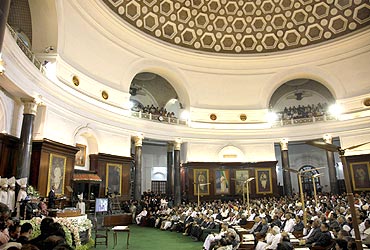
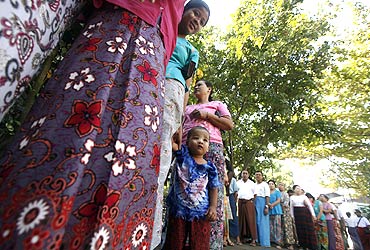
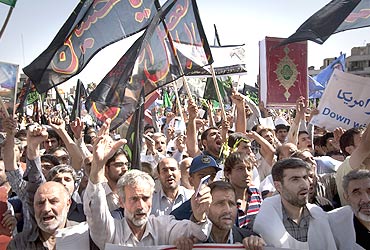

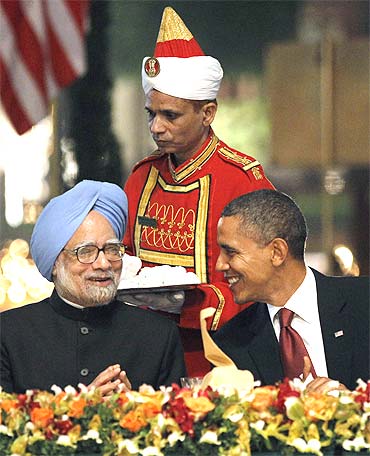
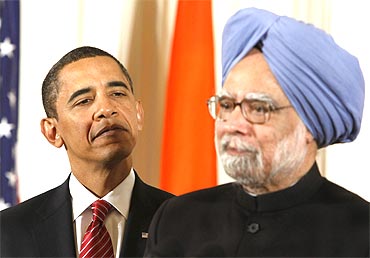
article